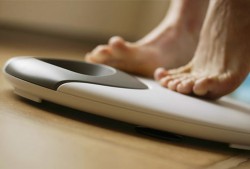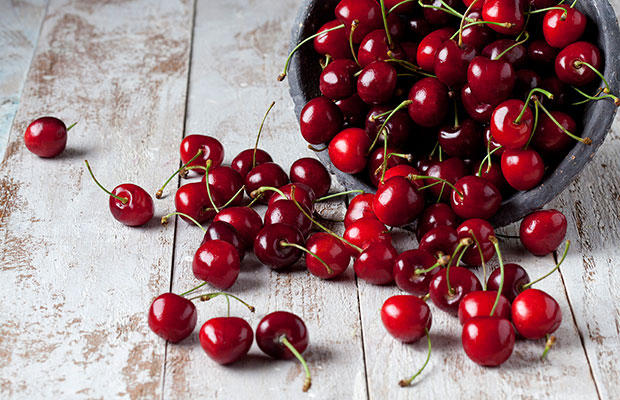How to Lose 5 Pounds in a Day
If you want to lose a small amount of weight quickly, you should do so effectively and safely, no matter your reason for wanting to shed pounds. However, you can safely shed weight from retained water and waste, and lose 5 lbs. (2.3 kg) or more within one day. Be aware, though, that this process cannot be safely repeated for more than one day (i.e. you cannot safely lose 15 pounds in three days), and the weight that you lose in one day is likely to return quickly. It is smart to maintain a healthy body weight, and weight loss should be combined with long-term lifestyle changes, like eating healthy and exercising.
Steps
Part 1 Losing Water Weight
-
1
Drink lots of water. Your body needs water to function and, if you aren’t drinking enough water each day, your body will retain excess water to make up for your deficient consumption.[1] If you aren’t currently consuming 64 ounces (1.8 liters) of water per day, make that your goal.
- You can to consume up to 135 ounces (4 liters).
- Ramp up your intake by 2 or 3 glasses of water per day if you are already drinking 64 ounces.
- Beware that increasing your water consumption to an unhealthy level can hurt your sleep patterns, interrupt your daily schedule, or lead to discomfort.
- You can include clear juices and teas in your estimated consumption.
-
2
Increase your physical activity. You can burn through more calories and remove more water weight and waste from your body by exercising.
- Walk for 30 minutes at lunch and after dinner.
- Avoid snacking in the evening; this will add weight that your body does not have time to burn off within one day.
- Perform strenuous chores around the house. Sweep, don’t vacuum; move all the furniture and clean under it, polish your banisters, etc.
-
3
Reduce your sodium intake. Sodium consumption leads to excess water retention, and can also lead to bloating and discomfort. Aim to eat less than 1,500 milligrams of salt per day. [2]
- The easiest way to reduce sodium is to cut out all processed foods. This includes cereal, baked goods, cheese, lunch meats, frozen vegetables, canned soups, canned vegetables or beans, and sliced bread. Salt is a preservative (as well as a flavoring), and processed foods are rich in salt.
- Consume foods with little to no processing, like eggs, wild rice, quinoa, fresh vegetables, fresh fruits, garlic, salads, freshly caught seafood, unsalted nuts and seeds.
-
4
Reduce your starch intake. [3] Like sodium, starch helps your body to retain water. If you cut starch from your diet today, you will retain less of the water that you consume. To cut back on starch consumption, avoid foods like:
- Pastas and French fries.
- Breads, cookies, and cakes
- Rice and baked potatoes.
Part 2 Removing Waste Weight
-
1
Exercise in the morning. Your metabolism and digestive system will start working more efficiently, and will process waste out of your body more quickly. [4] Focus especially on cardio exercises (as opposed to strength training); activities like running or jogging will raise your heart rate and help you burn off calories.[5]
- Walk, run, or do another cardio exercise for 20 to 30 minutes when you wake up.
- Go to the gym before work, rather than afterwards.
- Be careful not to exhaust yourself or exercise within one day to an unhealthy degree. It only takes like to moderate exercise to start your digestive tract working.
-
2
Eat a fiber-filled breakfast. Fiber will help keep food moving through your digestive tract, and push waste out of your colon.[6] Choose oatmeal, quinoa, low-fat Greek yogurt, unsalted nuts, a veggie omelet, or whole fruits.
- Eat your breakfast within 90 minutes of waking up.
- Plan to consume between 300 and 600 calories for breakfast.
- You should be consuming 25 to 30 grams of fiber per day, so increase your intake as needed to reach these levels.
- If you’re looking for a healthy breakfast, try this: combine your oatmeal, yogurt, and fruit in a smoothie. Put some leafy greens in the smoothie for added nutrition.
- 3 Drink a cup of coffee or tea in the morning. These natural diuretics (foods that increase the production urine and excrement) can help you to have a bowel movement.[7]
-
4
Eat fruits and vegetables that are natural diuretics. Plan today’s meals around these foods that will help you lose both water weight and excrement.
- Eat fruit like melon, cranberries, and tomatoes.
- Eat vegetables like asparagus, celery, parsley, cucumbers, fennel, lettuce, Brussels sprouts, carrots, and beets.
- Sip on tea that contains dandelion leaf, green tea, and nettle.[8]
Part 3 Changing Your Diet for the Day
-
1
Eat foods that contain probiotics. Probiotics are live yeasts and bacteria that are found naturally in your body. Foods containing probiotics help keep your gut healthy and move digested food through your stomach and intestines. [9]
- A small serving of Greek yogurt is ideal. Make sure it is low in sodium and contains active cultures.
- You can opt for kefir in place of yogurt. Kefir is a probiotic beverage available in most grocery stores.
-
2
Cut out carbohydrates on the day you want to lose weight. It may seem counterintuitive, but carbs actually raise the amount of water that your body stores.[10] You can help your body reduce water weight by getting all your carbs from fruits and vegetables that day
- Eat salads instead of sandwiches.
- Don’t eat breads, pastas, or other refined grain products.
- Studies suggest that maintaining a low-carb diet just three days a week can help you shed a few pounds and maintain your weight better. [11]
-
3
Eat less as the day goes on. You are more likely to burn off calories that are consumed earlier in the day than those consumed later on, so eat the bulk of your daily calorie intake during the morning and early afternoon.[12]
- Try to cut your meal sizes in half, or at least reduce your portion size for meals eaten later in the day.
-
10 Questions to Ask Yourself Before Choosing a Weight Loss Program
10 Questions to Ask Yourself Before Choosing a Weight Loss Pro
-
10 tips for those who are desperate to lose weight fast
Are you desperate to lose weight quickly but you do not know wh
-
Top 6 signs that you might be depressed (Video)
Depression is something t
-
How to Lose Weight on a Subway Diet
There are many diets and diet programs that can help you lose weight,
-
Strong Legs Workout
There are few things better to complete your goals than challe
-
Do Cheat Days Work? Science Has Your Answer
You're super regimented about what you eat all week—heavy on
- DON'T MISS
- Weight Loss Contest for the Summer
- Burning Fat Is The One Step To Effective Weight Loss Results
- Lose Weight Fast But Healthy With These Tips
- What’s in your Beverage?
- How to Lose Weight While Pregnant
- If Dieting Doesnt Work, What Does?
- Need To Lose Weight? Read On For Helpful Advice
- 5 Things To Never Say To Someone Considering Weight Loss Surgery
- Top Weight Loss Tips You Shouldn’t Miss
- Weight Loss Tip #88- Drink water before meals




